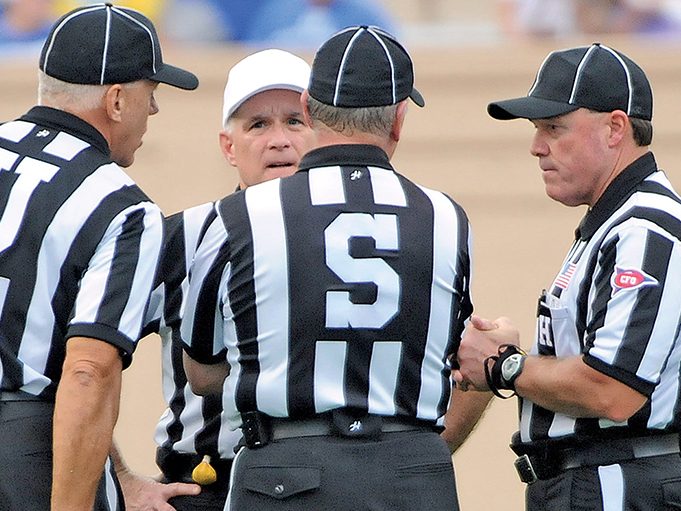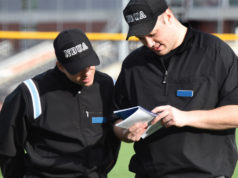As the crew chief, you’re the maestro on the field or court. That means you have a lot of responsibilities. You must be ready to lead.
Retired NBA referee, and current ESPN officiating analyst, Steve Javie was thrust into the role of crew chief early in his NBA career when the league moved from two officials to three after his second season. “Just by numbers alone, I was pushed up into a position of leadership not knowing what to do,” Javie said. “We didn’t have courses or classes in the NBA about how to be a crew chief. Has anybody, whether it be hockey, football, basketball or baseball, in their association ever had somebody sit down and say, ‘Here’s the course on being a crew chief’? No, we don’t have that. Somehow that’s missing.”
Missing until now.
Javie and current NBA Vice President of Referee Development and Training Monty McCutchen gave “the course” on how to be a crew chief during a workshop at a recent NASO Sports Officiating Summit. They took attendees through real-life situations and discussed the qualities that make a crew chief a true leader on and off the floor. Crew chief is more than just a title and it goes beyond any playing arena.
“We tend to think our senses let things in, that our eyes see things and our ears hear things, but the reality is that our five senses keep most everything out,” McCutchen said. “They’re filters to keep things out so that we can make sense of the world and have clarity to what we see. You can’t hear a dog whistle, you can’t hear the air conditioning, because our brain and our ears and eyes are doing that job of filtering for us.
“One of the big pitfalls to becoming a crew chief for the first time is thinking that you have to see everything, and of course when you try to see everything in a game you see nothing. You see the back ends of every play, you don’t see any play with any clarity or totality and you fall into a pit of catching the ends of things. When we do that, we’re not good officials and, more importantly, we’re not good leaders.”
What does it really mean to be a crew chief?
It Means … You Can Admit Mistakes
Any time you make a mistake during a game, it requires true humility to admit your error.
“I did some things early in my days as crew chief,” Javie said. “I learned from my mistakes. Hopefully that made me a better crew chief as I went along. A lot of times — the people at the NBA level or the NFL level, or NHL or MLB — all you see is the good they do. Let me tell you something. I made so many darned mistakes. If I didn’t learn from them, shame on me. I was fortunate to have a father who had 30 years in the NFL.”
Javie shared a story of the night when he was working a game with Joe Crawford in Detroit. After the game, “(NBA supervisor of officials) Darell Garretson came in the locker room and he had the tape,” Javie said. “He said, ‘We’re going to go back to the hotel and watch the tape.’ Oh my gosh. All I’m thinking on the ride back is that we’re going to put the tape in and it’s going to be ‘beat on Steve’ the whole time. And rightfully so, because I was horrible that night.
“I realized what a crew chief Joe Crawford was. He took everything off me and put it on him. He put the tape in, he ran the tape machine, and all he did was look at his mistakes and how he could’ve gotten better. Joe Crawford showed me what a good crew chief does, which is to take care of your partners.”
It Means … You Trust Your Partners
No matter what your role on any given night is, it’s important to trust the men and/or women that you are working with. Lack of trust puts a real damper on the crew.
Javie told of a game early in his career when he was designated as crew chief. Bill Spooner and Don Vaden were newer to the league and they were working together that night.
“A situation happened where I felt that a player threw a ball at my partner, Bill Spooner. Unfortunately, Billy caught the ball,” Javie said. “It was thrown hard, but being a young guy and not experienced enough, I sat there and said to myself, ‘He can’t do that; it’s got to be a technical foul.’ I think looking back maybe (the player) should’ve gotten a technical foul, but not from me because I’m down at the other end of the court.
“I elect not just to (give a technical), but I ejected the player from the game. I didn’t trust my partners. What kind of crew chief is that? My lesson that I learned that night, and there’s plenty of other lessons that I learned as a young crew chief, was that one of the biggest things you have to do as the crew chief is trust your partners and allow them to work and allow them to handle situations.”
Trusting your partners enables them to work with the confidence that you have their back if they need it, but you also know that they can take care of their own business when necessary.
It Means … You’re a Facilitator
The ability to facilitate discussion and draw things from others’ experiences will not only take you far in officiating but in your daily lives as well.
McCutchen shared the importance of being able to be a solid facilitator and manage the different personalities that may be on your crew on a given night.
“I think that being crew chief for me has evolved into a philosophy that you’re there to facilitate,” McCutchen said. “That starts at the assignment level. For us, there are hotels involved, there are rental cars, there’s what time are we getting in, are we going to have dinner the night before. … Instead of dictating those things, you open it up to a democratic process. ‘Where would everyone like to stay?’ instead of, ‘Hey, we’re staying here in Portland.’”
Sometimes conflicting personalities will need to gel for the sake of the officiating team. The crew chief needs to facilitate that. “There are times unfortunately, that crews maybe don’t get along, personality-wise,” Javie said. “But you’ve got to come together when the time is right.”
Being a crew chief is all about creating a sense that, “We’re in this together.” A strong leader will help build a sense of community.
“If you can start to create an environment in which everyone is empowered to be part of the team, that teamwork carries over,” McCutchen said. “We’re the third team on the floor. That teamwork carries over into performance, in which people aren’t fighting over who gets to go to the table, it flows the way the mechanics dictate it should flow, plays coming toward people, take the play. No one is feeling like they’re left out of the mix in those kinds of situations.”
It Means … You Take Care of Partners
While trust was already addressed, part of building on that trust is taking care of your partners whether it be on a big call or something as small as letting them throw the jump ball to get them in the game right away.
“I got my first crew chief lesson — I probably didn’t recognize it at the time — in my very first NBA game. I worked with Bennett Salvatore in Minnesota,” McCutchen said. “It was a Dallas Mavericks game and he found out through the day that I was from Dallas, and without any conversation about it at all, right before tipoff, he put the ball in my gut and said, ‘This won’t happen often, but go throw the jump ball. It will probably mean something to your dad back in Dallas to see you throw the jump ball.’
“Right then you felt like you had been included into the fraternity, and that you had been accepted by your partners on some level. That crew chief moment stuck with me. Who do I want to be in this profession?”
There will be times when you recognize that a partner is struggling on a particular night.
“You may be five minutes into the game and you look over and there’s somebody there that’s just going through the motions. You may have to go over and say, ‘Look, get in the game, get your head out of your (butt) and get said. “Something happened at work, something happened at home, and it’s on your mind and you’re not fully engaged in what you’re doing. You have to be able to get the rest of the crew in. You also have to be willing to accept that same criticism from someone else if you’re not in the game, because it happens to all of us.”
Javie added, “It’s really no different than life, too. If you’re a manager, you want to make the people around you better. When you’re a crew chief, guess what? Your job is to make those two guys the best they can be that night.”
It Means … You’re Competent
Having a working knowledge of the game is key for all officials. As a crew chief, you are looked to when questions arise about difficult scenarios or situations. You need to know what you’re doing.
“Obviously you have to be able to have the rules knowledge,” a Summit attendee noted. “You have to know what your job is. You also have to know what everybody else’s job is, and help them through that, not with criticism but with a little bit of motivation.
“You have to be an initiator. You have to have the initiative to go out there and do that. When push comes to shove and somebody has to make a decision and all eyes look at you if you are the crew chief. Everybody’s looking at you to make the decision and say, ‘OK, let’s move on.’”
Competency requires preparation. That preparation comes through practice in handling various types of scenarios.
It Means … You Earn Respect
“You have to be respected,” McCutchen noted. “You don’t demand respect, you earn respect. I think that’s important for us to realize. Just because you’re the crew chief or the head person on your crew doesn’t necessarily give you the right to be that respected individual. You have to earn it. Once you show that, you’ll have it for a long period of time until you give somebody reason not to give it to you anymore.”
There is no magic formula for getting other officials to respect you. You’ll earn respect by the way you conduct yourself over time. Be consistent in your approach to the game and your approach to individuals.
After Javie and McCutchen discussed what it means to be a crew chief, they broke the officials out into three smaller groups to cover the topic in more depth.
What Traits Should You Have?
Great crew chiefs have a variety of important traits and skills. Here are some examples that a group of officials at the Summit suggested are important.
- Preparedness. You’re ready for anything because of your experience and planning for different scenarios.
- Adaptability. If something out of the ordinary occurs prior to or during a game, you’re able to adjust and help your partners adjust.
- Respectfulness. You show respect to your peers, coaches and players.
- Competency. You know what you’re doing on the field or court. You bring a high-level knowledge of the rules and mechanics to the game.
- Confidence/poise. You act like you know what you’re doing. In tough situations, you don’t get rattled.
- Humbleness. You understand you didn’t get to where you are alone.
- Compassion. You care about your fellow officials and their trials during and away from the game.
- Sense of humor. Officiating is fun. You know how to laugh at yourself and enjoy the avocation or profession.
- Facilitator. No matter who is on your crew, you can bring the officiating team together for a common goal.
- Motivator. Sometimes officials need extra motivation, especially when they’re facing a bad match-up. You provide the spark when it’s needed.
- Initiator. You approach a struggling crewmate who needs assistance. By giving encouragement, you can turn things around.
- Mentor/teacher. You take the time to educate your partners before, during and after the game.
- Big-picture thinker. When things aren’t working, you can step back at halftime or between innings and provide a different game plan.
- Calming influence. Some people crack when a fight breaks out. You’re able to provide a steady approach.
- Decision maker/problem solver. You are ready with answers when questions are asked. You are the go-to person for issues that arise.
How Do You Improve?
Some officials have the traits and skills to make them a great crew chief from the start. Others acquire those attributes over time. Either way, you can always improve as a leader. Some ideas of how to do that include:
Be willing to help when needed.
It’s impossible for crew chiefs to always know exactly what to do when other officials need guidance, but you get better at it when you are available and willing to help. Stick around for a postgame conference. Be available via phone when questions come your way.
Become a good listener/ communicator.
You can’t help if you don’t listen to the problem. That means listening without interrupting. Even if you think you’ve heard enough to solve the problem, listen more. Your partners will gain respect for you if they are able to share their whole story. Listening takes patience, especially when it comes to longwinded partners.
Show respect for the primaries of your partners.
In other words, learn to count on your partners. It’s pretty hard for your partners to trust you if you continue to make calls in their area. Even if you’re more experienced, let your partners do their jobs.
Be aware of your surroundings/ situation.
A great way to improve your knowledge is by doing your homework. Rules and mechanics study is a given. You should also be aware of player/team tendencies, so you can inform your partners and have a productive pregame meeting.
Gain confidence through experience.
Confidence in leadership comes with practice. You’re going to make mistakes when serving as a crew chief, but that’s OK. You’ll handle it correctly the next time. You’ll also learn what to do and not do from crew chiefs you have been under in the past.
Work with mentees.
Volunteer to serve as a mentor as soon as your association allows it. Attending the extra games with your mentee and guiding him or her during and away from the game will assist you in your role as a crew chief.
Have a love for the game.
Never forget why you started officiating in the first place or why your fellow officials are giving of their time to the industry. A love for the game and avocation are almost always a part of the reasoning. Enjoy your role as a leader and pass that joy on to those working with you.
How Do You Set Yourself Apart?
Dare to be different. In order to set yourself apart as a crew chief off the field or court, you should remember the following tips.
Don’t act like a big shot; be one.
Act like a big shot and your peers will start to resent you. Be one in a humble manner and your peers will learn to respect you. The key is realizing that it’s not all about you. Don’t bring up a big game you were involved in. Wait for someone to ask you about it. And then, before long, shift the conversation back to your fellow officials.
Facilitate, communicate with and assist the group.
Share ideas that will help to make the lives of your fellow officials easier.
Find ways to empower members … delegate!
While you should volunteer for your share of work, you shouldn’t take over everything. The only way officials will learn how to become crew chiefs is through active participation. Spread the pregame responsibilities. Ask different members of the crew to be responsible for leading the pregame talk.
Allow risk taking.
You learn from your mistakes. Encourage your fellow officials to take officiating risks. If the risk doesn’t work, it’s a great chance to mentor them through the situation.
Establish personal connection.
Get to know your fellow officials away from officiating. Ask about their jobs and families. Show you care enough to want to know.
Put the crew first and yourself last.
In other words, ask your crew for opinions on everything from schedule to postgame restaurant. There are times when you will need to make executive decisions but getting feedback from your fellow officials is important.
Be an example in all interactions (even when you think no one is watching).
You’re a leader, so conduct yourself as a leader in all situations.
Javie recalled when veteran referee Wally Rooney set himself apart.
“Wally really took me aside,” he said. “I had one of those tough weeks and he took me out to dinner in Phoenix. I thought he was going to start talking about how bad I had done this week and that week. He said, ‘We’re not talking about basketball tonight. We’re talking about life and what’s important.’ Remember, this is a sport. We enjoy it. It’s not the end-all. Sometimes you have to get away from it.
“I think also a good crew chief knows that and knows what it takes in the younger guy to get away from it once in a while, to not talk about it, controversial stuff,” Javie said.
At the end of the day, how do you want to be remembered? What do you want people to say when they see your name on their schedule? “Life is all about people to me. It really is,” Javie said. “You will always remember the ones that treat you well.”
What's Your Call? Leave a Comment:
Note: This article is archival in nature. Rules, interpretations, mechanics, philosophies and other information may or may not be correct for the current year.
This article is the copyright of ©Referee Enterprises, Inc., and may not be republished in whole or in part online, in print or in any capacity without expressed written permission from Referee. The article is made available for educational use by individuals.



















